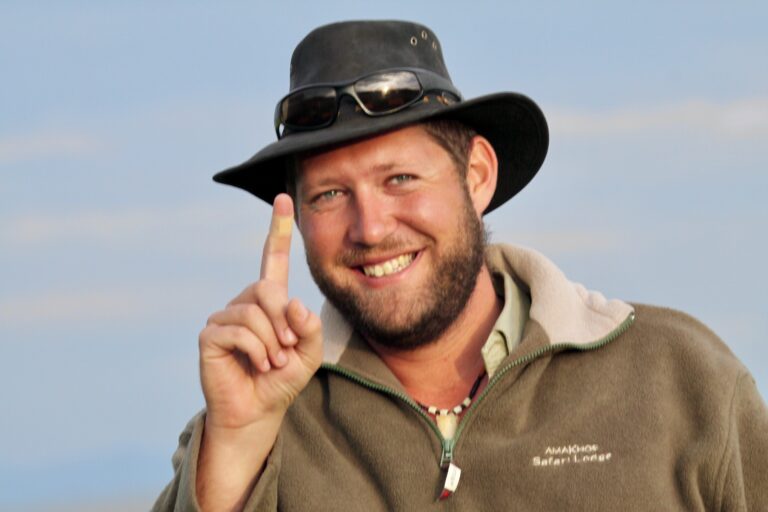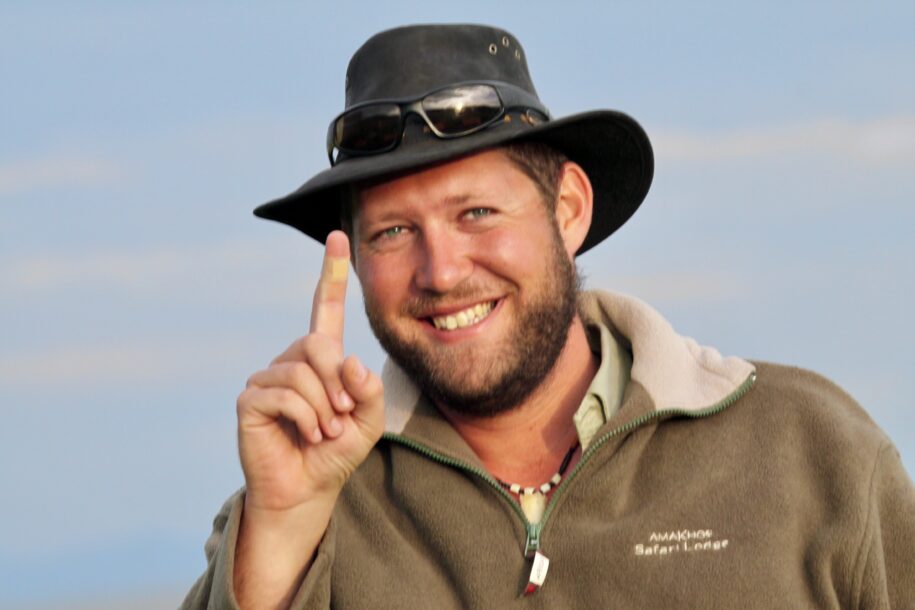Meet Your Guide: Jaco Becker A Short Biography
Growing up in the small town of Benoni on the East Rand of Johannesburg, my love for nature was evident from an early age. My family frequently took trips to Kruger National Park and other game reserves across South Africa. With many family and friends owning game farms, I spent much of my childhood exploring the bush, learning about wildlife, and developing a deep appreciation for the natural world. If I wasn’t in school, you could find me immersed in nature—reading books, watching documentaries, and absorbing every bit of knowledge I could find about the animals around me.
After completing high school in 1998, I pursued my passion academically, enrolling at the University of Pretoria to study Zoology. During my studies, I discovered a fascination for insects, which led me to complete my degree in both Zoology and Entomology in 2003. As I approached the crossroads of my career, an advertisement in the newspaper caught my eye: “Ranger Wanted in the Lowveld.” That moment marked the beginning of my extraordinary journey.

That First Job
Following a short guiding course and rigorous assessments in rifle handling, I became certified to guide paying clients in a Big Five reserve. My first job was in the Lowveld, right next to Kruger National Park. Back then, we were called rangers, not guides, and the role encompassed much more than just leading safaris. Alongside guiding guests, we monitored wildlife populations, maintained infrastructure, and played an active role in conservation efforts, including anti-poaching initiatives.
Life as a ranger was demanding but deeply rewarding. We adhered to strict discipline—our quarters had to be immaculate, our rifles pristine, and our vehicles maintained to perfection. I still remember receiving my uniform and my .458-caliber rifle, a weapon powerful enough to stop an elephant in its tracks. It commanded respect, and I gave it just that.
The job required long hours. A typical day began at 4 AM with a morning game drive or bush walk, followed by maintenance work around the lodge. In the afternoons, we embarked on evening game drives, later hosting guests at dinner until late into the night. A 20-hour day was not uncommon. The cycle repeated—six weeks on, two weeks off. Each day was a lesson in the wild, teaching me things that no textbook ever could. But after years of invaluable experience, it was time for the next adventure.
Moving South
My journey led me to a reserve further south, near Pongola in KwaZulu-Natal, where I was promoted to Head Ranger. It was a proud achievement, and I embraced the role with confidence and dedication.
Managing the reserve involved more than guiding; we tackled ecological challenges as well. One pressing issue was the invasion of alien plant species like Lantana and Paraffin Bush, both highly destructive to native vegetation. Lantana, a thorny and toxic plant, was spreading rapidly, while Paraffin Bush posed a severe fire hazard. I initiated an invasive species control program, securing funding to cut down and treat these plants to prevent regrowth. It was an ongoing battle, but over the years, we began to see progress.
Predator management was another key responsibility. Cheetahs and lions frequently broke out into neighbouring reserves, requiring careful tracking, darting, and relocation efforts. Cheetahs were relatively easy to locate, but lions were more elusive. To lure them, we used impala carcasses and audio recordings of hyenas and rival lions. These operations were challenging but crucial for maintaining balance within the reserve.
After many fulfilling years, the time came for yet another chapter.
Up to the North
I moved to Madikwe Game Reserve, a vast 70,000-hectare wilderness on the northern border of South Africa, adjacent to Botswana. Unlike my previous positions, where rangers were deeply involved in conservation management, Madikwe was overseen by the North West Parks Board. Here, my primary focus shifted to guiding, allowing me to fully immerse myself in showcasing the region’s unique wildlife and landscapes.
However, in 2008, rhino poaching began escalating at an alarming rate. What started as distant reports soon became a harsh reality on our own reserve. The first loss of a rhino was a devastating blow. We dedicated countless hours to security patrols and intelligence gathering, working tirelessly to thwart poachers. While many were caught, just as many slipped through. The fight against rhino poaching continues to this day, demanding relentless effort and sacrifice.
Full Circle
After leaving Madikwe, I spent time travelling across South Africa and Botswana, working as a freelance guide and experiencing diverse ecosystems. But everything changed when I became a father. Holding my daughter for the first time was a moment I will never forget. Soon after, my son was born, and my priorities shifted. My children became my world, shaping my every decision.
We moved back to the Lowveld, settling in Hoedspruit on the edge of Kruger National Park. There, we founded our own safari company, Lowveld Odyssey. The business flourished—until 2020, when COVID-19 devastated the tourism industry worldwide. Like many others, we had no choice but to shut down and weather the storm.
Recovery was slow and challenging, but resilience and the grace of God prevailed. In 2023, with the help of old friends I had met on safari, Intrepid Odyssey was born. Since then, the company has grown, and I have poured every ounce of my heart and soul into making it a resounding success.
Of course, with all the time I’ve spent in the bush, I have countless stories—some hilarious, others terrifying—of my encounters with wildlife and the people I’ve met along the way. But those tales are for another time…

